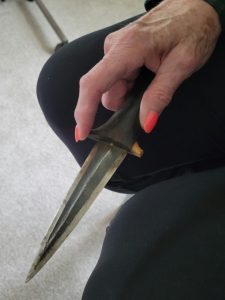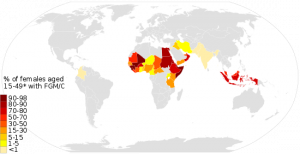43 Circumcision in Sudan 1977
Circumcision was a common practice in 1977 Sudan. This narrative is derived from secondhand descriptions of Sudanese colleagues and longterm residents. I never myself witnessed any of these events. Circumcision is applied to both male and female genitalia.
Male circumcision is practiced throughout the Muslim part of Sudan as required in the Koran. In Sudan boys will have their foreskin (or hamusa) cut off in a ritual ceremony in public. This rite of passage occurs when boys reach the age (5-6) varying from community to community.
One of my student informants tells me that in his community, the process takes place at about 5 years of age. The ritual takes involves many guests; the boy stands on a table in full view. Women ululate (high pitched joyful wailing) to honor the boy. An elder pulls the foreskin (hamusa) forward beyond the end of the penis and removes it with a knife. The process takes less than a minute. The boy stands during the surgery and is expected not to express the pain. (Should he cry he, will be shamed by his peers long afterward.) The hamusa is given to his grandmother who has a collection of the small dried up circles on a necklace that she wears in honor her grandsons. The lady with the most hamusas is regarded with highest esteem in the village.

An elderly women in the village takes on the task or removing the hamusa.
Female circumcision is practiced in a large part of the Sudan, but is not condoned by the Koran. Although it has been banned by Sudanese law, the practice continues and is now performed by the elder women in the family rather than by a surgeon. Because it is no longer allowed as a medical practice the incidence of tetanus or other infections has increased with respect to this operation.
Female circumcision is perceived as a means of maintaining the chastity of girls. Women who have not been circumcised are equated with prostitutes. The purpose of the sex act is for reproduction and not for pleasure.
Sometimes the act is done when the young girl is first noticed to be exploring her genitalia. The age varies from family to family and the community. Normally the clitoris (or part of it) is removed as well as the labia. In some cases infibulation is performed by partially sewing up the vaginal opening, making it impossible for the sex act to be performed without severe pain and bleeding.
When infibulation has been performed, it is expected that the husband on the wedding night will break open the restricted vagina with the sex act, producing much bleeding and agony. More frequently a chicken will be killed and the blood on a towel will indicate to the relatives that the husband has performed his ritual duty and the wife was truly a virgin. She is then taken to a physician who will surgically open the new wife’s vagina in a more professional and sanitary way. It may be months before the couple will be able to perform sex.
Sudanese Marriage
Many Arab marriages are arranged by their parents. One of my students knew who he was to marry when he was six years old. Their fathers were good friends and wanted to further solidify their relationship, He and his future wife played together as children but when they reached puberty they were separated never to see each other until their wedding day.
My student invited me to his wedding, which was coming up in about a week. I asked, “This is rather sudden, how long have you been planning this wedding?
“Twenty years, our families have been working out the details, waiting for me to be ready”
“Are you in love with her?” I asked.
“I am not sure; I have not seen her since she was twelve. We have been kept apart all this time.” The intent to maintain her virginity might have been comprised during puberty.
To ensure her chastity to her promised husband, her parents had her circumcised and infibulated, when her clitoris and labia were removed and the vaginal opening partially sutured. This mutilation keeps the woman from enjoying the sex act indicating that sex is for reproduction only. On their wedding night he killed a chicken whose blood was to show that he had broken her virginity with the sex act. In reality she needed to go into surgery to correct her mutilated vagina. It was six months before they could have intercourse.
One Sudanese man went to England for graduate studies and while there, married an English woman. When he returned to the Sudan with his wife, the mother-in-law could not accept the young woman because she had not been circumcised. The mother-in-law was able to put her concerns to rest immediately after the delivery of the couple’s first child when she slipped into the hospital and circumcised the anesthetized daughter in law.
The son was aghast with what had happened and immediately gathered up the parts and flew his mutilated wife to Lebanon to sew the pieces back in place. Unfortunately, it was too late and the damage was done.
Female circumcision was still continuing in many countries in Africa and parts of Arab world in 2017 There is a worldwide campaign to stop the practice as many governments and religious leaders have banned together to preach against it. Bill and Melinda Gates poured money into the effort to stop the practice of female genital mutilation. While strong traditions and family honor remain at stake, the practice may be declining.
 A composite data map showing the % of women and girls aged 15-49 years (unless otherwise stated) who have undergone FGM/C. Source: UNICEF (2016) and a number of additional studies for countries outside Africa not surveyed by UNICEF. Grey countries’ data are not covered.
A composite data map showing the % of women and girls aged 15-49 years (unless otherwise stated) who have undergone FGM/C. Source: UNICEF (2016) and a number of additional studies for countries outside Africa not surveyed by UNICEF. Grey countries’ data are not covered.

